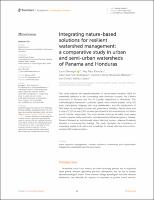Integrating nature-based solutions for resilient watershed management a comparative study in urban and semi-urban watersheds of Panama and Honduras
Fecha de publicación
23-10-2025Autor
Benegas Negri, Laura A
Ríos Ramírez, José Ney
Fino Rodríguez, Líber Ilyá
Mosquera Ballejos, Carlina Felicia
Ibáñez López, Ovidio
Objetivos de desarrollo sostenible
ODS 6 - Agua limpia y saneamiento
Tipo
Artículo
Metadatos
Mostrar el registro completo del ítemResumen
This study explores the operationalization of nature-based solutions (NbS) for watershed resilience in two contrasting Latin American contexts: the Caimito watershed in Panama and the El Coyolar watershed in Honduras. The methodological framework combined spatial multi-criteria analysis using GIS tools, participatory mapping with local stakeholders, and the classification of NbS based on ecological function and governance feasibility. Results show that a total of 1,220 ha and 1,870 ha were prioritized for NbS interventions in Caimito and El Coyolar, respectively. The most feasible practices included urban green corridors, riparian buffer restoration, and agroforestry infiltration systems. Notably, Panama followed an institutionally driven planning process, whereas Honduras adopted a community-led strategy. The study highlights the importance of integrating spatial tools with local knowledge to ensure effective and context-sensitive NbS implementation.
Palabras clave
Ordenación de aguas||water management||gestão da água||gestion des eaux, Resiliencia al clima||climate resilience||undefined||résilience face au climat, Uso sostenible de la tierra||sustainable land use||uso sustentável da terra||utilisation durable des terres, Gobernanza||governance||governação||gouvernance, Panamá||Panama||Panamá||Panama, Honduras||Honduras||Honduras||Honduras,
Representación
Sede Central
Editor
Frontiers
Es parte de
Conservation Science
Status
openAccess
URI enlace
https://doi.org/10.3389/fcosc.2025.1640398


